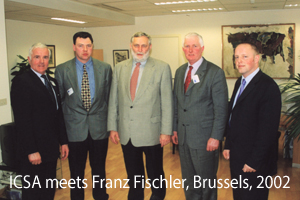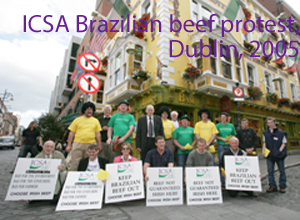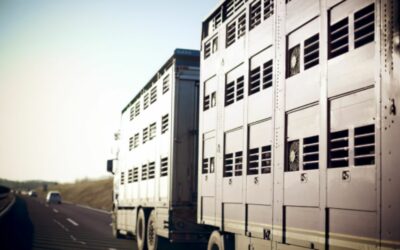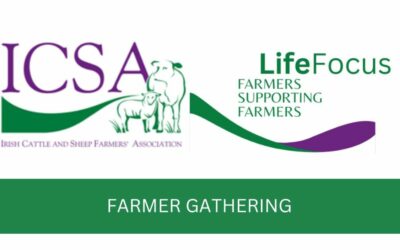ICSA Policy
The Irish Cattle and Sheep Farmers’ Association emerged as a farming lobby group, specifically for cattle and sheep farmers, following the 1992 MacSharry Reform of the CAP.
ICSA 1990-2000
The development of ICSA was inspired by the fact that beef and sheep farmers were not happy with their representation, and this was particularly manifested in the 1992 CAP reform, the so-called MacSharry reforms. Although these reforms managed to switch money from price support into premia payments which would be paid directly to farmers, there were a lot of anomalies and issues.
The farmers who began the development of ICSA identified a number of flaws and inequities introduced in the 1992 reform. These issues formed the basis of the ICSA policy objectives during the Agenda 2000 negotiations, right up to the Fischler reforms of 2003 and can be summarised as follows:
• Direct payments to farmers were based on quantity of production rather than quality of production
• The quota production system introduced acted as a barrier to entry and expansion for farmers
• Farmers who did not produce their own calves had their premia entitlements capitalized into the price of the cattle they purchased
• Premia entitlements were only granted on male calves leaving producers of heifer beef at a disadvantage
• Animal retention periods in order to collect premia led to distortions in the supply and price of both cattle and sheep
• The system became over-bureaucratic with excessive amounts of paperwork and form filling
• Export refunds paid to beef processors were passed onto third country meat buyers rather than back to producers
• Farm gate prices failed to keep pace with retail prices, resulting in retailers rather than farmers benefiting most from the EU direct payments system.
The ICSA policy response was to begin a campaign for decoupled area payments, from the mid 1990s onwards. However, while arguing for a complete overhaul of the payment system, ICSA successfully campaigned for some important modifications to the premia system, including a national envelope payment for heifers in Agenda 2000, which was a long held policy demand of the ICSA beef committee.
During these years, the association also became a radical voice for sheep farmers, playing a key role in getting sheep onto the national and European agenda. In late 1999, ICSA brought a huge demonstration of thousands of sheep farmers onto the streets of Dublin to highlight the fact that the sheep sector was the forgotten child of agricultural policy.
ICSA 2000/2001
ICSA made sure that the Minister of Agriculture at the time, Joe Walsh, took notice when at the end of the sheep march, ICSA’s sheep chairman famously got into a coffin, representing the sheep sector, and slept in that coffin outside the front door of the Department of Agriculture. The following day, Joe Walsh met ICSA, and the sheep sector was on the agenda.
This was followed up by a campaign in Europe, including a meeting held in the EU parliament on 9/11 which went ahead, even as the world was in shock at news of planes crashing into the Twin Towers in New York.
By the end of 2001, the EU had agreed to an increase in the ewe premium for 2002. Both the heifer premium and the increased sheep premium in 2002 were to prove extremely significant at a later stage when decoupling was introduced.
In 2002, ICSA’s vision was vindicated when Commissioner Franz Fischler proposed the introduction of radical reform under the mid-term review of the CAP. ICSA president Charlie Reilly led the campaign to support these proposals, and at that time, he was almost unique in Europe in identifying the benefits of this change, and he held important meetings in early 2003 with Commissioner Fischler to press home the case for change, even when other farm organisations were opposed to decoupling.
2003 saw the election of a new ICSA president, John Deegan who took over in April and took up the baton from Charlie Reilly on the CAP reform. Throughout the first half of 2003, ICSA was the only Irish farm organisation to support decoupling while others made all kinds of predictions that it would decimate the suckler herd and that farmers would abandon their farms to take up golf!
In June 2003, ICSA spent most of the month in Luxembourg for the key Farm Council negotiations. ICSA had regular meetings each day with the Minister and key officials and when a deal facilitating full decoupling was finally announced at the end of three weeks of negotiations, ICSA was fully vindicated for its stance. The icing on the cake was the subsequent decision by Minister Walsh to opt for full decoupling in October 2003 rather than the partial options favoured by a few countries (and by the meat industry).
ICSA 2004/2005
January 2004 saw a new president in place, Malcolm Thompson from Donegal, who had been elected before Christmas. While he continued to lobby for the key beef and sheep issues, the association also broadened its remit on issues such as hill walking and electricity pylons. ICSA decided it was time to take a stand on landowners’ rights which were being eroded by tourist and energy interests.
ICSA’s stance led to the establishment of Comhairle na Tuaithe which ensures that the development of hill walking can only be done in the context of respect for landowners and through negotiation between farmers and recreational and tourism representatives. Success was also achieved on protecting farmers’ rights in relation to electrical infrastructure projects in places such as Bantry, Co. Cork and West Limerick.
ICSA also took a distinct position on the issue of GM (Genetic Modification). The association argues very strongly that Ireland should pause before it grows GM crops in this country. The key reason is that we must think very carefully about the clean, green image of our key meat and dairy exports. Whether we like it or not, the reality is that many of the rapidly growing brands and retailers are emphasising GM free as a premium trait. The question for Ireland is: do we want to ignore that and become just another commodity exporter competing at the bottom of the barrel? The importance of ensuring that Irish exports have a premium and distinct image became all too clear when Brazilian beef imports into the EU became a huge problem in the mid 2000s.
ICSA was extremely active on the Brazilian beef imports, and even before it became a front page issue, was meeting and lobbying Food and Veterinary Office officials and the EU Commission to take a stronger position on Brazilian beef, based on the shortcomings identified in their own FVO reports. ICSA also worked with UK farm organisations under the FFE (Fairness for Farmers in Europe) banner, on the Brazilian beef issue, including meetings with Commissioner Fischer Boel.
FFE was set up by Farmers For Action activist William Taylor from Northern Ireland and it has included associations such as the FUW in Wales, FFA in the UK, the Scottish Beef Cattle Association and the Northern Ireland National Beef Association, among others. It continues to campaign on key issues such as a fairer price for product for farmers and key activities include supermarket protests which ICSA support.
ICSA 2006/2009
2006 was another landmark year for ICSA with the announcement by Minister Mary Coughlan that the Taoiseach was to make ICSA a social partner. This means that ICSA is now a recognised and official representative of farmers on all government forums and has the same negotiating right as other farm organisations, as well as employers and trade unions.
2008 was an extremely worrying year for beef farmers, as WTO negotiations were seemingly progressing towards a deal on import tariff reduction which would have had extremely serious consequences for Irish beef. ICSA president Malcolm Thompson led a protest on the streets of Brussels and outside the British embassy against the possible sell out of EU agriculture by EU Trade Commissioner, Peter Mandelson.
ICSA spent most of July 2008 in Geneva for daily meetings with Minister Smith and his officials as the WTO talks went on, and at one stage the deal was close to being signed. At the 11th hour, against all odds, the WTO deal collapsed thus averting a potentially devastating blow to the beef sector. Since then, the WTO has made no progress although ICSA remains vigilant against the possibility of an EU/ Mercosur bi-lateral deal.
ICSA 2010/2011
Gabriel Gilmartin took over as ICSA president in 2010. Global economic melt-down and the arrival of the Troika/IMF in response to the disastrous state of the national finances means that ICSA is now operating in a vastly different environment. The job of a farm organisation has changed from campaigning for additional supports to campaigning against more cuts. The 2009 decision to cut REPS and Disadvantaged Area payments remains the most severe cutback – but there is a continuing job fighting to ensure that the replacement AEOS scheme is worthwhile and that payments are made on time, while also fighting against further cuts to schemes such as the Disadvantaged Area Scheme.
Issues affecting the broader rural community such as septic tank charges and rural crime have also come to the fore. On education, ICSA is campaigning against taking farm assets into account when assessing eligibility for third level education grants.
While the budgetary situation is grim, agriculture has had something of a rebirth in terms of national image and importance. Gabriel Gilmartin was a member of the Food Harvest 2020 committee that has outlined the potential for increased agrifood exports. However, ICSA believes that subsequent amendments to the Food Harvest 2020 targets on expanding beef output by 40%, made by an implementation group, are misguided. The problem is that beef production can only expand if extra high value markets are secured. Without this, extra output will simply lead to price collapse.
ICSA has credibility in talking about beef price. In January 2011, ICSA predicted that beef prices were set to increase substantially during the year and that an unprecedented €4/kg was likely. This turned out to be remarkably accurate and was linked to an analysis of the effects of scarcity on price.
ICSA 2012/2013
During 2012 & 2103, the policy focus was firmly on the latest round of CAP reform. Having campaigned for the decoupled payment model, ICSA successfully campaigned against any return to coupled payments. ICSA also worked hard to prevent reductions to farm payments across too short a time frame.
Commissioner Ciolos proposed a move to a flat rate payment within member states and a redistribution of payment rates between member states during the period 2014-2019, with a lot of the reform front-loaded to 2014. Along with this came proposals for a ‘greener’ CAP.
ICSA is not opposed to a greater recognition of the fact that Irish agriculture already has excellent green credentials – but there were concerns that the details of the greening would be unworkable and overly-bureaucratic.
On the flat rate proposal, ICSA stated that it was unworkable in an Irish context. The association was opposed to severe cuts to the current payment levels of ordinary family farms that are above the national average while it accepted that there needed to be targeted increases for certain categories of young and active farmers who are below the national average.
Our Latest News
ICSA SLAMS UNFAIR TARGETING OF IRISH LIVESTOCK HAULIERS ABROAD
ICSA president Sean McNamara has said he is urgently seeking clarification regarding the recent targeting of Irish livestock trucks by Irish officials at the port of Cherbourg. “ICSA has been contacted by several of the livestock hauliers affected who claim they were...
ICSA LIFE FOCUS TO HOST FARMER GATHERING
ICSA’s Life Focus group will host a farmer gathering on Sunday 14 April at the Castletown Geoghegan Community Hall in Castletown Geoghegan, Co Westmeath, Eircode N91 NV0T. The gathering will commence at 7.30pm. Chair of ICSA Life Focus Mona O’Donoghue Concannon said,...
Not A Member Of ICSA Yet? Join Us Now!
Be a member here at ICSA and enjoy these various discounts offered by our partners:
10% or €100 off the cost of AXA Farm Insurance for members of ICSA
2.5 Cent off Pump Prices at Participating Fuel Stations
10% Off Farm Equipment Marking Systems
€20 Off IAS Laboratories Soil/Silage/Water Testing





